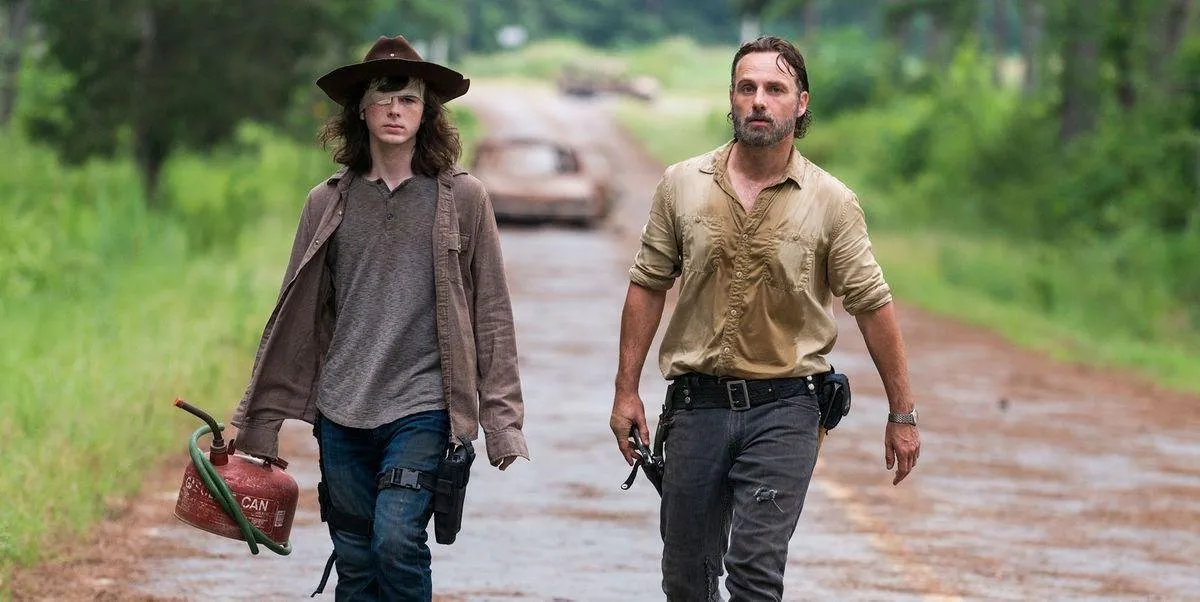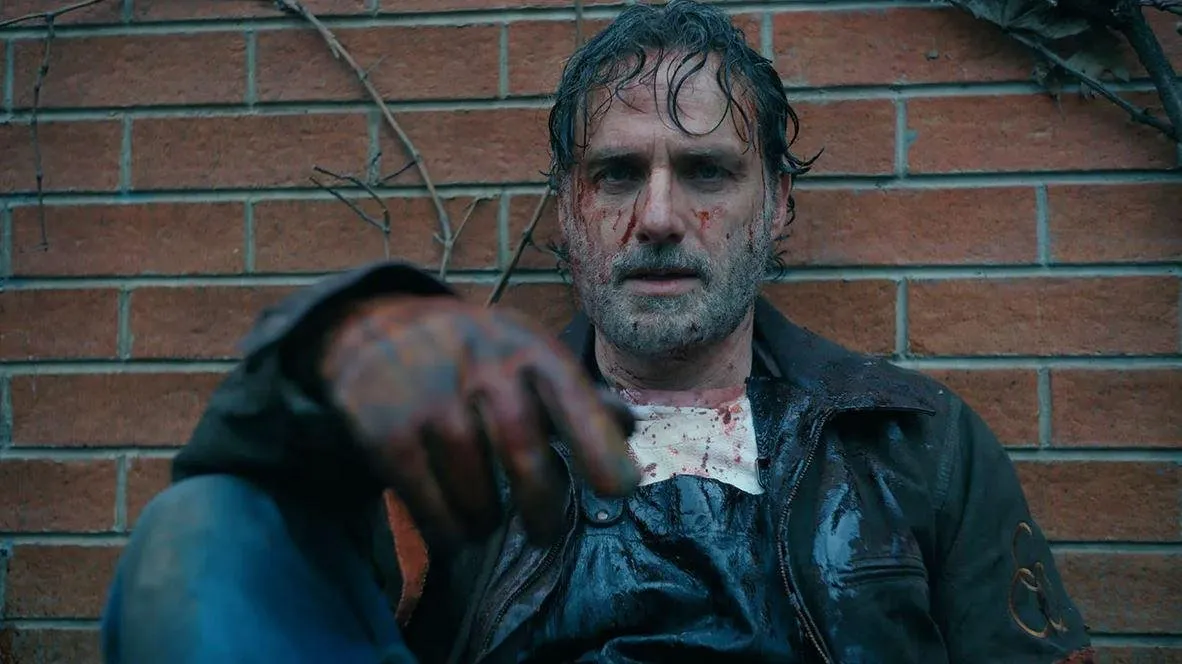

Before the apocalypse, Rick Grimes was a sheriff's deputy in King County, Georgia. He was married to Lori Grimes and had a son, Carl Grimes. Rick was shot in the line of duty and fell into a coma, only to wake up and find the world overrun by zombies. Rick's background as a law enforcement officer played a significant role in his ability to adapt to the new world. His skills and experience allowed him to quickly assume a leadership role among the survivors he encountered. Throughout the series, Rick's past is often referenced, highlighting the stark contrast between his life before and after the apocalypse.
Despite the challenges he faces, Rick remains committed to upholding the values he held as a sheriff. He believes in justice, order, and the protection of the innocent. However, as the series progresses, Rick is forced to confront the harsh realities of the post-apocalyptic world, leading him to make increasingly difficult decisions that challenge his moral compass.

Rick Grimes' relationship with his son, Carl, is a central theme in The Walking Dead. Throughout the series, their bond evolves as they navigate the challenges of the post-apocalyptic world together. Initially, Rick is protective of Carl, wanting to shield him from the harsh realities of their new world. However, as Carl grows older and more capable, Rick begins to see him as a partner in survival. This shift is marked by several key moments, such as when Carl saves Rick's life or when Rick teaches Carl how to shoot a gun. Despite their close bond, Rick and Carl's relationship is not without conflict. They often disagree on how to handle certain situations, with Carl sometimes questioning his father's decisions. However, these conflicts ultimately serve to strengthen their bond, as they learn to trust and rely on each other.

When Rick Grimes and his group arrive at the community of Alexandria, they are initially met with skepticism. However, Rick quickly proves his worth, taking on a leadership role and helping to fortify the community's defenses. Rick's arrival marks a turning point for Alexandria. Under his guidance, the community becomes more self-sufficient and better prepared to face the threats of the post-apocalyptic world. However, Rick's methods often clash with the more pacifist approach of Alexandria's original leader, Deanna Monroe. Despite these conflicts, Rick remains committed to protecting Alexandria and its residents. He sees the community as a beacon of hope in a dark world, a place where his family can live in relative safety.
Throughout The Walking Dead, Rick Grimes' leadership style evolves in response to the challenges he faces. Initially, Rick is a reluctant leader, stepping up only when necessary to protect his family and friends. However, as the series progresses, Rick becomes more assertive, taking on a more authoritative role. Rick's leadership is marked by his willingness to make tough decisions, even when they are unpopular. He is guided by a strong moral compass, believing in the importance of protecting the innocent and upholding justice. However, Rick also recognizes the need for pragmatism in the post-apocalyptic world, leading him to make difficult choices that sometimes conflict with his moral beliefs. Despite his flaws, Rick's leadership is respected by those around him. He is seen as a figure of strength and resilience, someone who can be relied upon in times of crisis.

One of the most significant challenges faced by Rick Grimes in The Walking Dead is the threat posed by Negan and the Saviors. This notorious group of survivors uses intimidation and violence to extort resources from other communities, posing a major threat to Rick and his group. Rick's first encounter with the Saviors is a brutal one. Negan, the leader of the Saviors, kills two of Rick's group members in front of him, asserting his dominance. This event marks the beginning of a long and bitter conflict between Rick and Negan, with both sides suffering heavy losses. Despite the odds, Rick refuses to back down. He rallies several communities together, forming an alliance against the Saviors. This united front ultimately proves successful, leading to Negan's defeat and imprisonment.
Rick Grimes' relationship with Shane Walsh is a significant aspect of The Walking Dead. The two were best friends before the apocalypse, serving together as sheriff's deputies. However, their friendship is tested in the post-apocalyptic world, leading to a dramatic falling out. The tension between Rick and Shane arises from their differing views on survival. While Rick believes in upholding law and order, Shane is willing to do whatever it takes to survive, even if it means sacrificing others. This conflict comes to a head when Shane attempts to kill Rick, resulting in Rick being forced to kill Shane in self-defense. Despite their conflict, Shane's influence on Rick is undeniable. Their relationship serves as a reminder of the difficult choices that must be made in the post-apocalyptic world, highlighting the moral complexities of survival.
Rick Grimes' meeting with Michonne is a pivotal moment in The Walking Dead. Michonne, a skilled survivor with a mysterious past, first encounters Rick and his group when they are being held captive by the Governor, the leader of the hostile community of Woodbury. Michonne helps Rick and his group escape from Woodbury, forming a close bond with them in the process. She quickly proves herself to be a valuable ally, demonstrating her skills as a fighter and strategist. Rick's relationship with Michonne is marked by mutual respect and trust. They rely on each other for support and guidance, forming a strong partnership. Over time, Michonne becomes one of Rick's closest confidants, serving as a voice of reason in times of crisis.

One of the most shocking moments in The Walking Dead is the loss of Rick Grimes' hand. This event occurs during a confrontation with the Governor, who captures and tortures Rick. In an attempt to break Rick's spirit, the Governor chops off his hand with a machete. Despite the trauma of this event, Rick refuses to let it break him. He adapts to his new circumstances, learning to fight and survive with one hand. His resilience in the face of adversity serves as an inspiration to those around him, demonstrating the strength of the human spirit. The loss of Rick's hand is a significant turning point in his character development. It forces him to confront his own vulnerability, leading him to question his ability to protect those he cares about. However, it also serves as a reminder of his determination and resilience, highlighting his unwavering commitment to survival.
In the ninth season of The Walking Dead, Rick Grimes is presumed dead after an explosion on a bridge. However, it is later revealed that Rick survived and was rescued by Anne, also known as Jadis. Rick's apparent death marks a significant turning point in the series. His absence is deeply felt by the other characters, who struggle to fill the leadership void he left behind. However, Rick's legacy continues to influence the events of the series, with his values and beliefs guiding the actions of those he left behind. Despite his presumed death, Rick's story is not over. It has been confirmed that Andrew Lincoln, the actor who portrays Rick, will reprise his role in a series of upcoming films set in the world of The Walking Dead. These films will explore what happened to Rick after his rescue by Anne, shedding light on his continuing journey in the post-apocalyptic world.
Throughout The Walking Dead, Rick Grimes undergoes significant character development. He starts off as a sheriff's deputy, a man committed to upholding law and order. However, as the series progresses, Rick is forced to adapt to the harsh realities of the post-apocalyptic world, leading him to make increasingly difficult decisions. Rick's character development is marked by his evolving leadership style. He starts off as a reluctant leader, stepping up only when necessary to protect his family and friends. However, as the series progresses, Rick becomes more assertive, taking on a more authoritative role. Despite his flaws, Rick remains committed to his values, believing in the importance of protecting the innocent and upholding justice. However, he also recognizes the need for pragmatism in the post-apocalyptic world, leading him to make difficult choices that sometimes conflict with his moral beliefs. Rick's character development is a testament to the complexities of human nature. He is a flawed hero, a man who struggles to balance his moral beliefs with the harsh realities of survival. Despite his flaws, however, Rick remains a figure of strength and resilience, a symbol of hope in a dark world.
In conclusion, Rick Grimes is a complex character whose journey through The Walking Dead is marked by leadership, survival, and difficult moral choices. From his background as a sheriff's deputy to his role as a leader in the post-apocalyptic world, Rick's experiences serve as a testament to the strength of the human spirit. Despite the challenges he faces, Rick remains committed to his values, demonstrating the importance of upholding justice and protecting the innocent. Through his relationships with other characters, such as his son Carl, Michonne, and Shane, Rick's journey highlights the complexities of human nature and the difficult choices that must be made in the face of adversity. Despite his presumed death, Rick's legacy continues to influence the events of The Walking Dead, serving as a symbol of hope and resilience in a dark world.
